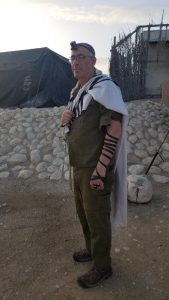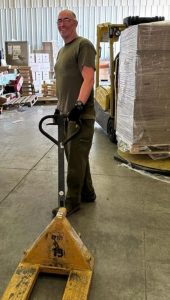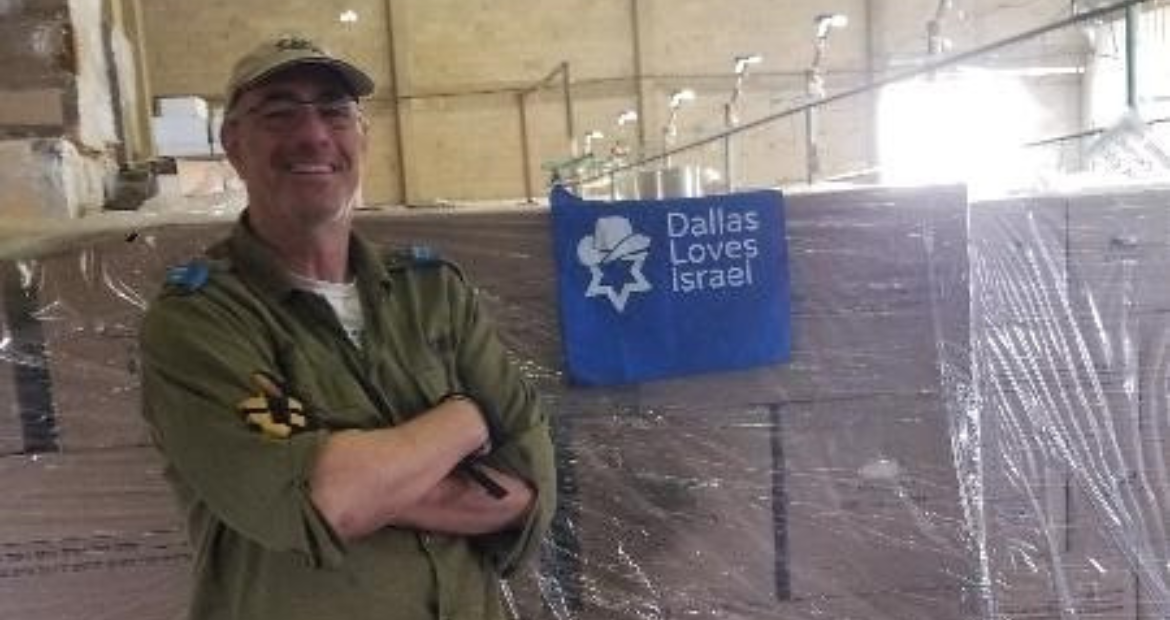When the October 7 pogrom hit, I had just come home from Sukkot services where author Dara Horn discussed her new book, Everyone Loves Dead Jews. As I went to bed, my Red Alert missile app was going crazy indicating hundreds of missiles had been fired at Israel from Aza. I have the app because not only is my youngest son studying at Yeshiva Ohr Semach in Jerusalem but also so I can keep an eye on my cousins and friends all over Israel. I initially thought, “It’s just Hamas acting up, Israel will bomb somewhere, and we will go back to normal. No need to wake my wife.”

I was wrong. Very wrong. After verifying that my son and our family were “ok,” we watched both Israeli and American news stations non-stop for the next three days. We didn’t go to the Ben Folds concert that night; we didn’t go out for dinner; we just spent days on the phone with the airlines and State Department trying to absorb the awful news and struggling with whether we should bring our son home.
Soon thereafter, I recalled hearing about Sar-El, a volunteer organization that puts volunteers in non-combat positions to free up real IDF soldiers. Their website, however, had not yet been updated to reflect the awful events of October 7, so I simply emailed any address I could find telling whoever might read it that I was ready to come. Of course, this intention had not yet been vetted with my wife or employer.
Luckily, my wife (a dual Israeli citizen having made Aliyah in the 90s) and my employer agreed to ensure that I could make up any missing vacation days and that my health insurance would cover any claims from Israel. Next, was the call to my life insurance agent: “Would my life policies be void if I am killed by a missile attack while working on an IDF base during a war or a terrorist attack?” After a long pause, my agent assured me I was covered.
Not too long after, I got an email from Sar-El asking me for a Zoom interview with a promise that I could be approved relatively soon. I suddenly wondered, what had I gotten myself into? My wife, sensing my apprehension, dryly said, “Well, sh”t just got real. You still have to go.”
After a pleasant zoom call, completing further forms, including a medical clearance for strenuous work along with a waiver acknowledging that I might be placed on a base that did not have air conditioning, heat and described as “Spartan” conditions along with the possibility I could be killed, I waited for the greenlight. I then got a call from a Sar-El volunteer telling me that the IDF had so many reservists report for duty and that I might have to find my own accommodations and commute to the base every day…would I still come? My answer was “Of course” and I immediately started to look for a place near the base. Sar El and the IDF were scrambling in unprecedented times, and I was urged to be flexible.
After clearing my desk and getting work in order I was set to leave on Thanksgiving (the first I have ever missed with my family) flying DFW to JFK and then on to Tel Aviv. Ben Gurion Airport is normally a hive of activity with flights and travelers coming and going from all over the world. I landed to find a nearly deserted airport. The excitement one usually feels getting off El Al and heading towards customs was muted—no groups singing songs, no group leaders shepherding tourists, just Israelis and their families coming home to war. The grand entryway was covered in posters for each of the hostages still held by Hamas.
It was also the beginning of the cease fire and after several weeks of constant missile bombardments, Israelis were ready for a break. I ultimately met up with my SAR-El group and we were divided into two groups. One went to a base near Tel Aviv to work on updating field medical kits. The rest of us were to head south to a logistics base (Hetzarim). Although the medical kit team was to stay on the base, the southern logistics team would stay in a campground just north of Mitzpeh Ramon in the Negev as our logistics base was just west of Beer Sheva and had no barracks available for us.
My group was an amazingly diverse collection of Zionists, Jews and non-Jews alike from all over the world. One volunteer was from the Tyrols in Austria and had a Jewish father and grandfather who survived the Shoah. He later converted on his own. There were several non-Jewish U.S. ex-military and Vermont state trooper who just felt the need to contribute. There were many French Jews and, surprisingly, a group of non-Jews from France who spoke fluent Hebrew and lived on a French “Kibbutz” according to the Torah as lived in the time of Jesus. The rest were Jews from the U.S., U.K., France, and Hungary. We were led by active-duty soldiers who acted as counselors and then directed by active-duty members of the IDF logistic corps.
Once at our campground, we were given IDF uniforms and volunteer insignias. At first, I was hesitant to don an IDF uniform as I felt like a tourist or a LARPer (live action role player), but as we spent time working as hard as we could and carrying our share of the load, I found the active IDF welcomed us in their mess hall and base. One told me, “You bought your own ticket to fly here and work all day on our base while we are getting bombed? Thank you! It means so much to know you’re here.”
After the Hamas attacks of October 7, the IDF first called up the special forces and then the next call was to the logistics corps, who are charged with making sure that all the critical equipment gets where it needs to go ensuring that soldiers get weapons and ammo, fuel is available for the tanks, APC, and trucks and, most importantly, the soldiers have meals delivered to them.
The IDF normally has about 170,000 active soldiers. After the call ups, that number more than doubled and each and every soldier in the field needed food to supplement their MREs. The IDF has a massive warehouse complex at the base capable of loading and unloading more trucks than I could count all day and night. Our job was to pack and prepare protein meal supplement kits, get them on pallets and have them ready to be loaded on trucks for the field. At first, I was honestly a little disappointed. I heard that some volunteers got to work on tanks, artillery and the “cool stuff”. But, as I quickly learned, every job a Sar-El volunteer completes frees up an active-duty soldier to fill an actual combat role. If I wasn’t there, a soldier would have to do my job. In other words, there are no small jobs.
Understanding that, our teams broke the base record for supplements prepared in one day for two consecutive days. My understanding is that we packed over 31,200 protein bags in one day. We later shifted the line and switched to preparing Shabbos kits for the soldiers, including challahs, grape juice and Shabbos treats along with a plastic-coated list of Shabbos brachot. Even in war, Israel never strayed away from its mission as the homeland for the Jewish people. Enabling Shabbos and kashrut was just as important as other military needs.

After completing my first week, I returned for a second week and with the cease fire over, and our campground located just north of the Ramon Air Force base and southeast of Gaza, we were treated to the sound of F16s and helicopters constantly running their missions. These sounds were a constant reminder that there was an actual war going on, but they were also welcome in that Israel was fighting and fighting hard.
We were occasionally joined on the base by a busload of bubbies and zaydies who came in from Jerusalem to help us out for the day. At first, I thought they were not going to last and would just get in the way, but this dedicated bunch had family and especially grandkids serving in Gaza, and they worked at their given tasks as hard as the rest of us, refusing breaks.
One grandfather started writing messages to the soldiers on the inside of every box he taped with a distinctive green marker. One day, he got a call indicating that his own grandson had randomly received one of the boxes with the green message from his own grandfather.
One of the few Sar El rules we were given was that political discussions were forbidden on base. Although this rule was broken immediately, the good news is that the volunteers, even with their different perspectives and orientations, all agreed that Israel needed to win the war and that our political differences could wait until the war was successfully concluded.
During the second week and after the cease fire, Hamas resumed its missile attacks and a regular target was our base near Beer Sheva. We had two separate chances to witness Iron Dome in action up close. Once we had to rapidly exit our bus and immediately find a ditch as missiles heading towards our base were intercepted. Another time, the missiles were fired while we were working inside and had to evacuate to the nearest bomb shelter. The first attack included four intercepted missiles, one of which fell to the ground about 100 yards from where we were laying low. The second attack included no fewer than ten missiles. Each time, we could feel the launch of the Iron Dome interceptors and feel the concussive wave of energy from the interceptions.

In my second week, I was lucky enough to be joined by a Sar El veteran and AEPI brother, Gord Akum from York University in Toronto. Gord and I hit it off immediately. Not surprisingly, we had both been personally recruited by Andy Borans to re-found or found our respective chapters. The AEPi commitment to Israel and Zionism travels well.
I left Israel knowing we had contributed but with a strong sense that I needed to return as soon as possible and do more.
